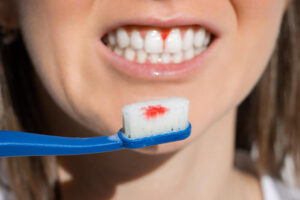Bleeding gums can be alarming, but it’s not uncommon. There are several reasons why your gums might be bleeding, and understanding these causes can help you take better care of your oral health. Below, we’ve outlined some of the most common reasons for bleeding gums, explained in a simple and easy-to-understand way.

1. Poor Oral Hygiene
-
- Not brushing and flossing regularly can lead to plaque buildup.
-
- Plaque is a sticky film of bacteria that forms on your teeth and gums.
-
- If plaque isn’t removed, it can harden into tartar, which can irritate your gums and cause them to bleed.
2. Gingivitis
-
- Gingivitis is a mild form of gum disease.
-
- It occurs when plaque and tartar buildup cause inflammation in the gums.
-
- Symptoms include red, swollen, and bleeding gums.
-
- The good news is that gingivitis is reversible with proper dental care.
3. Periodontitis
-
- If gingivitis is not treated, it can progress to periodontitis.
-
- Periodontitis is a more serious gum disease that can damage the soft tissue and bone supporting your teeth.
-
- Symptoms include bleeding gums, receding gums, and even tooth loss.
-
- Treatment by a dentist is necessary to manage periodontitis.
4. Aggressive Brushing
-
- Brushing too hard can damage your gums.
-
- Using a toothbrush with hard bristles can also cause your gums to bleed.
-
- Opt for a soft-bristled toothbrush and brush gently in a circular motion.
5. Using the Wrong Flossing Technique
-
- Flossing is essential, but doing it incorrectly can harm your gums.
-
- Snapping the floss between your teeth too forcefully can cause bleeding.
-
- Instead, slide the floss gently between your teeth and curve it around each tooth.
6. Vitamin Deficiency
-
- Lack of certain vitamins, especially vitamin C and vitamin K, can make your gums more prone to bleeding.
-
- Vitamin C helps in the repair and growth of tissues, including your gums.
-
- Vitamin K is essential for blood clotting, which helps prevent bleeding.
7. Medications
-
- Certain medications, like blood thinners, can increase the risk of bleeding gums.
-
- Inform your dentist about any medications you’re taking.
-
- Your dentist can provide guidance on how to manage this side effect.
8. Hormonal Changes
-
- Hormonal changes during pregnancy, menstruation, or menopause can make gums more sensitive.
-
- This increased sensitivity can lead to bleeding gums.
-
- It’s important to maintain good oral hygiene during these times.
9. Smoking
-
- Smoking weakens your immune system, making it harder for your body to fight off gum infections.
-
- Smokers are more likely to develop gum disease, which can lead to bleeding gums.
-
- Quitting smoking can significantly improve your gum health.
10. Poor-Fitting Dental Appliances
-
- Dentures or other dental appliances that don’t fit properly can irritate your gums.
-
- This irritation can cause your gums to become sore and bleed.
-
- If your dental appliances don’t fit well, visit your dentist for an adjustment.
11. Infections
-
- Gum infections caused by bacteria, fungi, or viruses can lead to bleeding.
-
- Symptoms of a gum infection may include swelling, redness, and bleeding.
-
- Your dentist can prescribe medication to treat the infection.
12. Stress
-
- High stress levels can negatively affect your immune system.
-
- This can make your gums more susceptible to infections and bleeding.
-
- Managing stress through relaxation techniques and a healthy lifestyle can benefit your oral health.
13. Diabetes
-
- People with diabetes are at a higher risk of developing gum disease.
-
- High blood sugar levels can lead to an increase in plaque and tartar buildup.
-
- Managing your blood sugar levels and maintaining good oral hygiene can reduce the risk of bleeding gums.
14. Crooked Teeth
-
- Misaligned teeth can make it difficult to clean your teeth properly.
-
- This can lead to plaque buildup and gum irritation, causing bleeding.
-
- Orthodontic treatment, like Invisalign, can help align your teeth and improve your gum health.
15. Tooth Decay
-
- Cavities and tooth decay can spread to your gums, causing them to bleed.
-
- Regular dental checkups can help catch tooth decay early before it affects your gums.
16. Food Particles Stuck in Your Gums
-
- Tiny food particles can get stuck in your gums, especially if you don’t floss regularly.
-
- These particles can irritate your gums, leading to inflammation and bleeding.
-
- Regular flossing and rinsing your mouth after meals can help prevent this.
17. Allergic Reactions
-
- Some people may experience an allergic reaction to certain dental products, like toothpaste or mouthwash.
-
- This can cause gum irritation and bleeding.
-
- If you suspect an allergic reaction, switch to hypoallergenic dental products and consult your dentist.
18. Autoimmune Diseases
-
- Autoimmune diseases like lupus can affect your gums, leading to inflammation and bleeding.
-
- Managing your overall health can help control the symptoms affecting your gums.
19. Dry Mouth
-
- A lack of saliva can lead to dry mouth, which increases the risk of gum irritation and bleeding.
-
- Staying hydrated and using saliva substitutes can help manage dry mouth.
20. Not Visiting Your Dentist Regularly
-
- Regular dental checkups are crucial for maintaining healthy gums.
-
- Your dentist can spot early signs of gum disease and other issues that may cause bleeding.
-
- If you live in Mt.Vernon, NY, make sure to schedule an appointment with a dentist in Mt.Vernon, NY, like Dr. Amul Patel, to keep your gums healthy.
What Should You Do If Your Gums Are Bleeding?
-
- Brush and Floss Regularly: Make sure to brush and floss twice a day to remove plaque and food particles that can cause gum irritation.
-
- Use a Soft-Bristled Toothbrush: Choose a soft-bristled toothbrush and be gentle while brushing to avoid further irritation.
-
- Visit Your Dentist: If your gums are bleeding, don’t ignore it. Visit your dentist to determine the cause and get appropriate treatment.
-
- Eat a Balanced Diet: Ensure you’re getting enough vitamins and minerals, especially Vitamin C and Vitamin K, to keep your gums healthy.
-
- Stay Hydrated: Drink plenty of water to prevent dry mouth and keep your gums moist.
-
- Quit Smoking: If you smoke, quitting can greatly improve your gum health.
When to See a Dentist?
If your gums are bleeding regularly, it’s important to see a dentist. Bleeding gums can be a sign of underlying health issues that need professional attention. For those in Mt.Vernon, NY, consider visiting Dr. Amul Patel, a trusted dentist in MMt.Vernon, NY, for a thorough examination and personalized treatment plan.
By understanding the common causes of bleeding gums and taking steps to address them, you can maintain healthier gums and a brighter smile. If you have any concerns or need professional advice, don’t hesitate to reach out to a Dentist in Mt.Vernon, NY, like Dr. Amul Patel. Your oral health is important, and taking care of your gums is a key part of keeping your whole mouth healthy.
